
Subscribe
eNewsletter

Ready to get certified?
Free CDCES Coach App
Download
Free Med Pocket Cards

JT tells you, “if I have a steak and salad for dinner, I will give myself 2-3 units of bolus insulin”.
What is the best response?
Click Here to Test your Knowledge
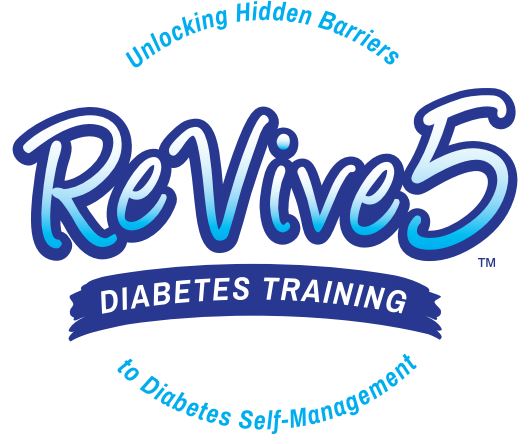
Whether you are a novice or an expert in providing diabetes care, we invite you to attend this exciting training program that provides the essential steps to address diabetes distress combined with an innovative approach to glucose management that will revolutionize your practice.
“ReVive 5” breathes new life into our relationship with diabetes, bringing a fresh perspective to both the person with diabetes and the provider.
Team of Experts:
ReVive 5 is taught by a team of 3 Interdisciplinary Experts:
Training Program Includes:
Speakers Interviews – Learn more about the ReVive 5 Team
What is the Biggest Takeaway when Addressing Diabetes Distress? – Dr. Susan Guzman
Do you have to be a Mental Health Expert to Tackle Diabetes Distress? – Dr. Lawrence Fisher
Why I Transformed my Approach to Diabetes Self-Management Education- Coach Beverly
Don’t worry if you can’t make it live. Your registration guarantees access to the recorded version in the Online University.
All hours earned count toward your CDCES Accreditation Information
Sign up for Diabetes Blog Bytes – we post one daily Blog Byte from Monday to Friday. And of course, Tuesday is our Question of the Week. It’s Informative and FREE! Sign up below!
The use of DES products does not guarantee the successful passage of the CDCES exam. CBDCE does not endorse any preparatory or review materials for the CDCES exam, except for those published by CBDCE.
I love November because we get to celebrate National Diabetes Month and World Diabetes Day on November 14th, which is Dr. Banting’s Birthday.
One hundred and one years ago, two researchers kick-started the production of insulin, making it available for worldwide use and saving millions of lives. Now, that’s a real cause for celebration. The discovery of insulin by Banting, Best, and team was no easy feat. They encountered resistance, setbacks, and failures.

Dr. Banting secured space to test out his theory at the University of Toronto during a hot summer in 1921. Along with his colleague, Charles Best, and a bare-bones lab, they conducted dozens of experiments on dogs. Marjorie (dog 408) lived for 70 days without a pancreas due to receiving life-saving insulin injections.
This success was replicated in other experimental dogs and ultimately provided the first step toward producing insulin from pig and cow pancreases.
In 1922, children with type 1 diabetes started receiving early doses of this newly available life-saving hormone. Leonard Thompson, was the first recipient in January 1922, followed by many thereafter. Here is a heartbreaking then uplifting photo of J.L., who after 2 months of receiving insulin, transformed into a healthy young boy.
To learn more about the Discovery of Insulin and download historical slides Click here!

For the month of November:
Sign up for Diabetes Blog Bytes – we post one daily Blog Byte from Monday to Friday. And of course, Tuesday is our Question of the Week. It’s Informative and FREE! Sign up below!
[yikes-mailchimp form=”1″]Accreditation: Diabetes Education Services is an approved provider by the California Board of Registered Nursing, Provider 12640, and Commission on Dietetic Registration (CDR), Provider DI002. Since these programs are approved by the CDR it satisfies the CE requirements for the CDCES regardless of your profession.*
The use of DES products does not guarantee the successful passage of the CDCES exam. CBDCE does not endorse any preparatory or review materials for the CDCES exam, except for those published by CBDCE.

For last week’s practice question, we quizzed test takers on the new ADA/EASD Standards. 56% of respondents chose the best answer. We want to clarify and share this important information, so you can pass it on to people living with diabetes and your colleagues, plus prepare for exam success!
Before we start though, if you don’t want any spoilers and haven’t tried the question yet, you can answer it below: Answer Question
Question:
The new ADA /EASD Management of Hyperglycemia in Type 2 Consensus Statement 2022 was just released.
Which of the following is an accurate recommendation according to these updated guidelines?
Answer Choices:
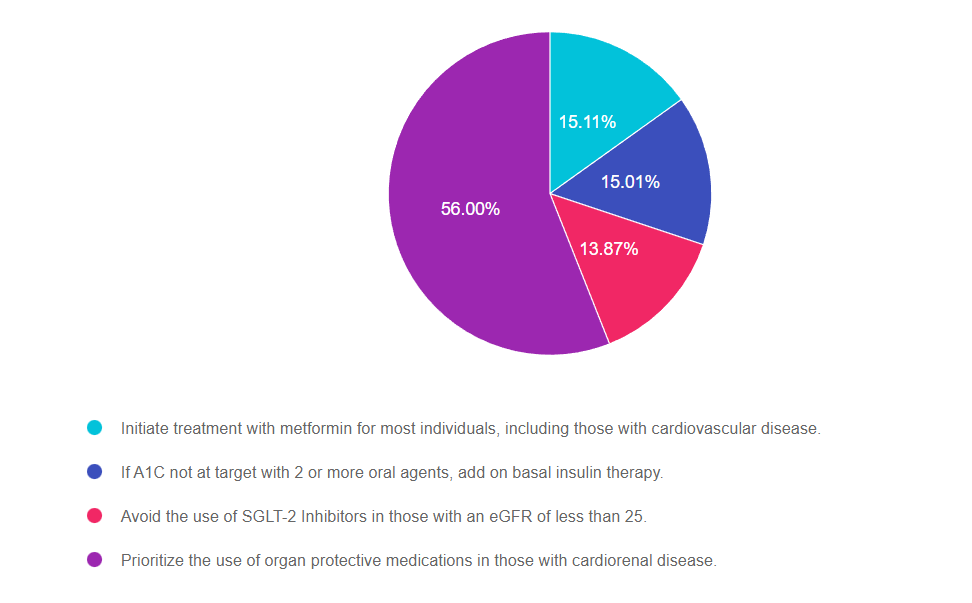
Answer 1 is incorrect. 15.11% chose this answer, Initiate treatment with metformin for most individuals, including those with cardiovascular disease.” In the past, this would have been the best answer, but based on latest guidelines, metformin is no longer the only first treatment. Based on the individual and our risk assessment (ie heart or renal failure or elevated CV risk) we could choose a SGLT-2 or GLP-1 as first line therapy.
Answer 2 is incorrect. 15.01% of you chose this answer, If A1C not at target with 2 or more oral agents, add on basal insulin therapy.” With the guidelines, they strongly suggest starting a GLP-1 RA before starting basal insulin as the first choice if possible. GLP-1 is preferred since insulin therapy is associated with hypoglycemia and weight gain, while the GLP-1’s is associated with weight loss, CV risk reduction and no hypoglycemia.
Answer 3 is incorrect. 13.87% of respondents chose this answer, “Avoid the use of SGLT-2 Inhibitors in those with an eGFR of less than 25.” This is a juicy answer, but the new guidelines encourage the use of SGLT-2 Inhibitors in people with diabetes with a GFR of 20 or greater, stopping SGLT-2 therapy when dialysis is started. Even with stage 3 & 4 kidney failure, SGLT-2’s can effectively slow the progression of kidney disease and improve CV outcomes in people with diabetes.
Finally, Answer 4 is correct. 56.00% chose this answer, Prioritize the use of organ protective medications in those with cardiorenal disease.” YES, GREAT JOB. This is the best answer. We are encouraged to target therapy based on the individual and to protect organs. For people with renal and heart failure, SGLT-2’s are the preferred class and for people with CV disease, starting either a GLP-1 or SGLT-2 decreases risk of major adverse cardiovascular events (MACE). We hope you can join our webinar on December 1st to learn more.

Plan on joining this exciting webinar that walks participants through the newly released, “Management of Hyperglycemia in Type 2 Consensus Report by the ADA and EASD”. She will highlight the revised guidelines with a focus on new elements and exciting changes on how we approach medication management for type 2 diabetes. Together, we will explore clinical factors to consider when determining the best strategy to improve glucose management in people with type 2 diabetes and other co-conditions. There will be a special focus on cardiovascular risk reduction and renal protection and addressing clinical inertia.
Objectives:
Intended Audience: A great course for health care professionals seeking evidence-based information that improves the quality of life and outcomes.
Don’t worry if you can’t make it live. Your registration guarantees access to the recorded version in the Online University.

RT says they keep using the same site for their insulin pump, since it doesn’t hurt as much. When you evaluate their abdomen, you notice a large lump at the site.
Why are you worried about this practice?
Click Here to Test your Knowledge
It’s election day. Let’s make sure to get to out and Vote!

Whether you are a novice or an expert in providing diabetes care, we invite you to attend this exciting training program that provides the essential steps to address diabetes distress combined with an innovative approach to glucose management that will revolutionize your practice.
“ReVive 5” breathes new life into our relationship with diabetes, bringing a fresh perspective to both the person with with diabetes and the provider.
By releasing old habits that no longer serve us, we have the opportunity to create a new life tool kit toolkit in partnership with the person living with diabetes.
The ReVive 5 program is built on international research study results and will revolutionize your approach to diabetes self-management education.
Team of Experts:
ReVive 5 is taught by a team of 3 Interdisciplinary Experts:
Training Program Includes:
Don’t worry if you can’t make it live. Your registration guarantees access to the recorded version in the Online University.
All hours earned count toward your CDCES Accreditation Information
Sign up for Diabetes Blog Bytes – we post one daily Blog Byte from Monday to Friday. And of course, Tuesday is our Question of the Week. It’s Informative and FREE! Sign up below!
The use of DES products does not guarantee the successful passage of the CDCES exam. CBDCE does not endorse any preparatory or review materials for the CDCES exam, except for those published by CBDCE.
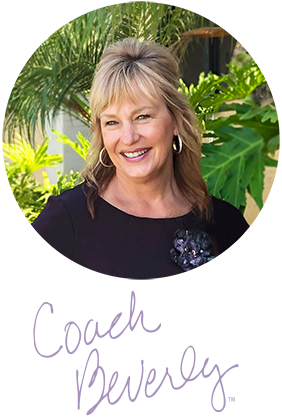
We are excited to announce the new ADA/EASD Consensus Statement on the Management of Hyperglycemia in Type 2 diabetes. Coach Beverly has poured through the pages of this document and is thrilled to share her findings with you. Key points are summarized in the blog article below and you are invited to join her upcoming Diabetes ADA/EASD Updates Webinar on Dec. 1st.
To celebrate Diabetes Month and say thank you to our community of diabetes educators and advocates, we are pleased to announce our annual Cyber Monday Sale.
Take 30% off ALL of our online university courses and bundles on November 28th, for one day only.
Given the prevalence of insulin rationing due to the high cost, we explore reasons and provide resources to help. Hopefully, through advocacy and legislation, this life-saving hormone will be made affordable to people with diabetes in the near future.
We detail the new Freestyle Libre 3 glucose sensor, which is not only smaller but offers several critical features that improve ease of use and functionality for individuals and providers alike.
As the holidays roll around, this can be a gastronomically and emotionally challenging time for people living with diabetes. We are happy to share our “Surviving the Holidays” Handout with all of you. Please feel free to print and share it with your community.
Lastly, we encourage you to test your knowledge with our Question and Rationale of the Week.
Happy Diabetes Month and thank you for your care, concern, and advocacy for people living with diabetes. With thanks,
Beverly, Bryanna, and Amanda
Featured Articles
FREE Resources

Whether you are a novice or an expert in providing diabetes care, we invite you to attend this exciting training program that provides the essential steps to address diabetes distress combined with an innovative approach to glucose management that will revolutionize your practice.
“ReVive 5” breathes new life into our relationship with diabetes, bringing a fresh perspective to both the person with with diabetes and the provider.
By releasing old habits that no longer serve us, we have the opportunity to create a new life tool kit toolkit in partnership with the person living with diabetes.
The ReVive 5 program is built on international research study results and will revolutionize your approach to diabetes self-management education.
Team of Experts:
ReVive 5 is taught by a team of 3 Interdisciplinary Experts:
Training Program Includes:
Don’t worry if you can’t make it live. Your registration guarantees access to the recorded version in the Online University.
All hours earned count toward your CDCES Accreditation Information
Sign up for Diabetes Blog Bytes – we post one daily Blog Byte from Monday to Friday. And of course, Tuesday is our Question of the Week. It’s Informative and FREE! Sign up below!
The use of DES products does not guarantee the successful passage of the CDCES exam. CBDCE does not endorse any preparatory or review materials for the CDCES exam, except for those published by CBDCE.

For last week’s practice question, we quizzed test takers on how Metformin impacts cancer risk. 64% of respondents chose the best answer. We want to clarify and share this important information, so you can pass it on to people living with diabetes and your colleagues, plus prepare for exam success!
Before we start though, if you don’t want any spoilers and haven’t tried the question yet, you can answer it below: Answer Question
Question:
JR is taking Metformin 1000mg BID but is worried that it may increase their risk of cancer and is thinking about stopping the metformin.
Which of the following is an accurate statement regarding metformin, cancer and safety?
Answer Choices:
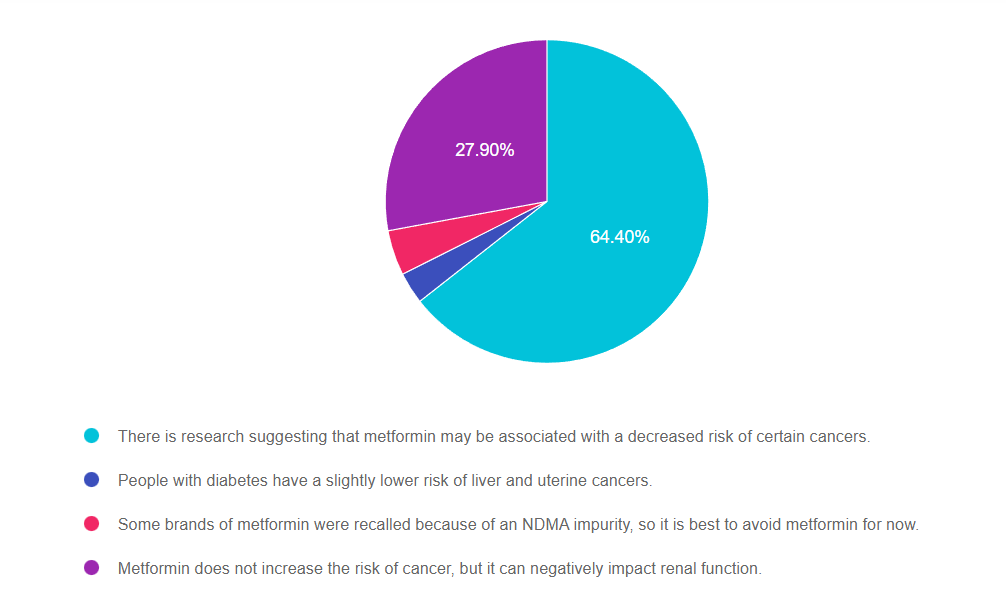
Answer 1 is correct. 64.40% chose this answer, “There is research suggesting that metformin may be associated with a decreased risk of certain cancers.” YES, this is the best answer, GREAT JOB. Research is showing that metformin decreases risk of DNA replication disruption, improves cellular health and increases telomere length. In addition, it enhances intestinal microbial diversity, decreases inflammation and lowers glucose levels. There are many research studies investigating metformin’s potential for cancer prevention and improvement of treatment outcomes.
Answer 2 is incorrect. 3.17% of you chose this answer, “People with diabetes have a slightly lower risk of liver and uterine cancers.” People with diabetes are actually at higher risk for liver, pancreas and breast cancer. Researchers aren’t sure exactly why, but insulin resistance, extra body weight, and DNA replication disruption in addition to genetics and social determinants of health, all seem to play a part.
Answer 3 is incorrect. 4.52.% of respondents chose this answer, “Some brands of metformin were recalled because of an NDMA impurity, so it is best to avoid metformin for now.” Since the NDMA impurity was recognized, manufacturing processes were improved to prevent future contamination. Metformin is an important treatment option for people living with diabetes.
Finally, Answer 4 is incorrect. 27.90% chose this answer, “Metformin does not increase the risk of cancer, but it can negatively impact renal function.” Metformin does NOT harm the kidneys. As a matter of fact, metformin protects the kidneys by lowering blood sugars and decreasing inflammation. It is true that people with a GFR below 30, need to avoid metformin to prevent lactic acidosis, however this a VERY rare complication. Metformin is the most widely used diabetes medication world-wide and it has an excellent safety profile. Bonus note, metformin ER causes less GI upset and costs the same as the non-extended release version ($4 a month).
Thank you so much for reading this “Rationale of the Week”. You can download our Medication PocketCard, for more information.
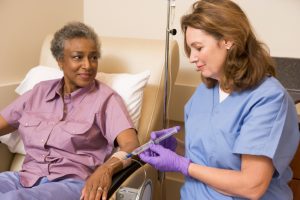
Diabetes Education Services Online University Courses are an excellent way to study for your exam anytime and anywhere that is convenient for you. You will have immediate access to your courses for 1 year after your purchase date. Each individual online course includes a: video presentation, podcast, practice test and additional resources.
Patients with cancer often experience hyperglycemia secondary to treatment, which can increase risk of infection and compromise their nutritional status. In addition, recent research has identified the link between diabetes and cancer. Join us to learn more about this unexpected link and treatment strategies for steroid induced hyperglycemia using a case study approach.
Objectives:
Intended Audience: These courses are knowledge-based activities designed for individual or groups of diabetes educators, including RNs, RDs, Pharmacists, Nurse Practitioners, Clinical Nurse Specialists, Physician Assistants and other health care providers interested in enhancing their knowledge of diabetes management for people with cancer.
Don’t worry if you can’t make it live. Your registration guarantees access to the recorded version in the Online University.
All hours earned count toward your CDCES Accreditation Information
Sign up for Diabetes Blog Bytes – we post one daily Blog Byte from Monday to Friday. And of course, Tuesday is our Question of the Week. It’s Informative and FREE! Sign up below!
The use of DES products does not guarantee the successful passage of the CDCES exam. CBDCE does not endorse any preparatory or review materials for the CDCES exam, except for those published by CBDCE.
In the summer of 2021, I decided it was time to get my first pet as an adult. I had just bought my first home and felt I finally had the space to get an animal.

I looked on my local shelter’s website and immediately fell in love with Biscuit. She’s a Calico with striking green, grumpy eyes. Her profile said she had been in the shelter for a long time and wasn’t doing well in that environment. I knew I wanted to bring her home where she could feel safe. I filled out an application and set up an appointment to see her. The next day she came home.
When she arrived, she immediately hid under the couch, unsure of where she was. I sat on the floor with her for a while until she felt okay enough to come out. It took many months for her to feel comfortable, and though at times she is still very anxious, she has relaxed enough to let her personality shine through. She is silly, loves to snuggle, and has a lot of cattitude.
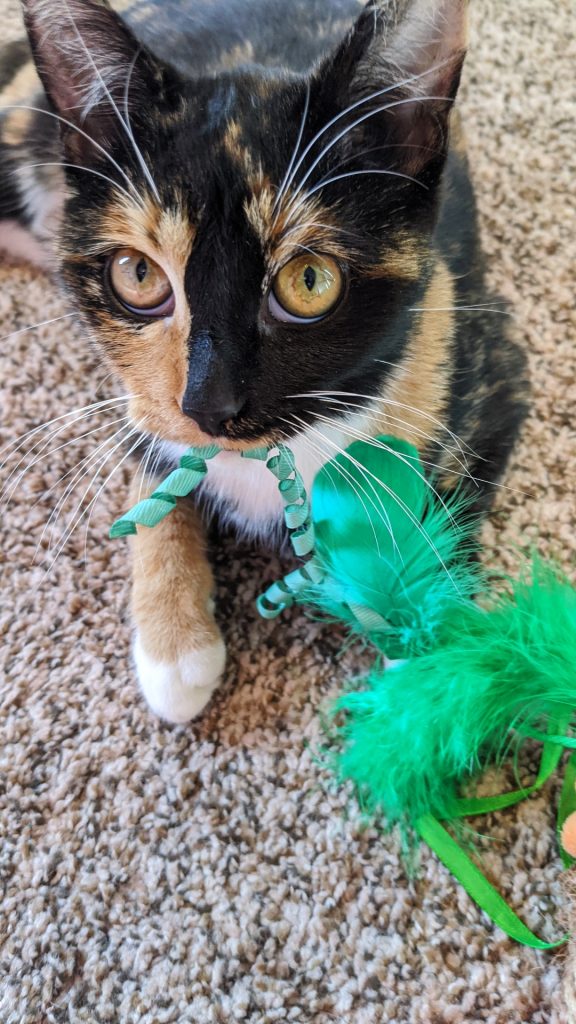
Due to all of her progress, I thought she now might enjoy a friend to hang out with.
In November, I checked my local shelter’s website again and saw Muffin, who like Biscuit, is a Calico with beautiful eyes. Again, I contacted the shelter and went to pick her up. For the first three days, I kept both cats in separate areas of the house, while slowly introducing them over the past few weeks.
Every day, Muffin is building her confidence in her new home; she is very curious, sweet, and loves to play.
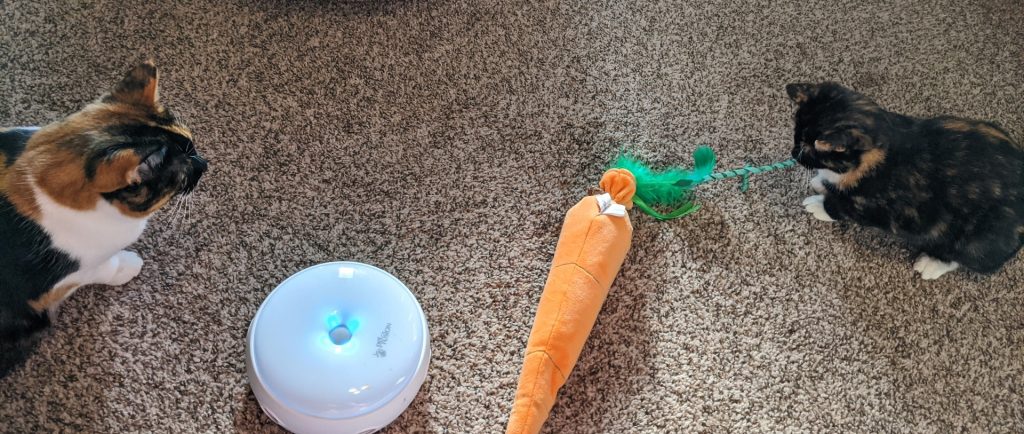
Biscuit is still struggling with a new cat in the house, but they are slowly making progress and spending more time together. Muffin loves to follow Biscuit around and mimic what she is doing. I have even caught them laying down next to each other.
I know it will take more time until they become friends, but I am so joyful their relationship is growing.
Written by Bryanna, our Director of Operations & Customer Happiness
Sign up for Diabetes Blog Bytes – we post one daily Blog Byte from Monday to Friday. And of course, Tuesday is our Question of the Week. It’s Informative and FREE! Sign up below!
The use of DES products does not guarantee the successful passage of the CDCES exam. CBDCE does not endorse any preparatory or review materials for the CDCES exam, except for those published by CBDCE.

The new ADA /EASD Management of Hyperglycemia in Type 2 Consensus Statement 2022 was just released.
Which of the following is an accurate recommendation according to these updated guidelines?
Click Here to Test your Knowledge

Plan on joining this exciting webinar that walks participants through the newly released, “Management of Hyperglycemia in Type 2 Consensus Report by the ADA and EASD”. She will highlight the revised guidelines with a focus on new elements and exciting changes on how we approach medication management for type 2 diabetes. Together, we will explore clinical factors to consider when determining the best strategy to improve glucose management in people with type 2 diabetes and other co-conditions. There will be a special focus on cardiovascular risk reduction and renal protection and addressing clinical inertia.
Objectives:
Intended Audience: A great course for health care professionals seeking evidence-based information that improves the quality of life and outcomes.
Don’t worry if you can’t make it live. Your registration guarantees access to the recorded version in the Online University.